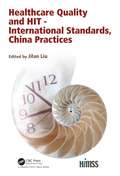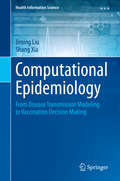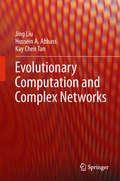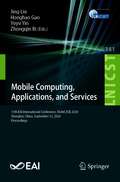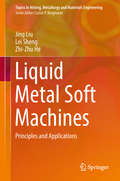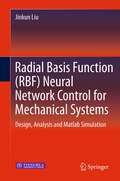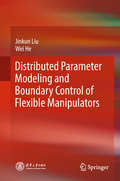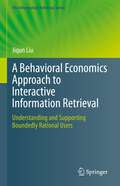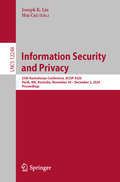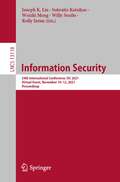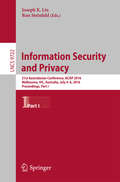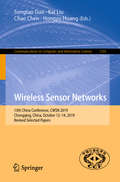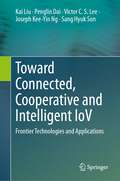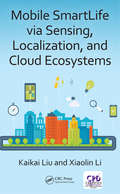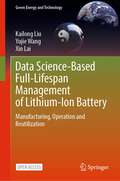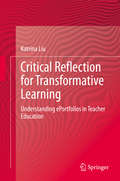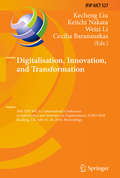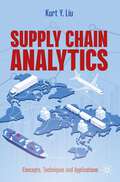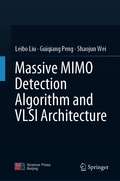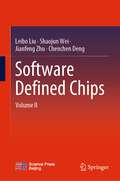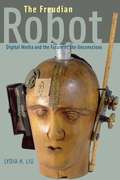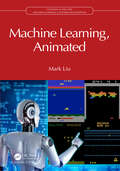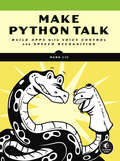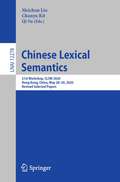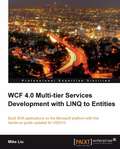- Table View
- List View
Healthcare Quality and HIT - International Standards, China Practices (HIMSS Book Series)
by Jilan Liu Jiaxin Wang Xinyue Du Zhuo Li Mu Tian Xiangjuan KongHow Chinese hospitals have been growing and adopting international standards such as JCI and HIMSS EMRAM to fuel their advancements is not well-known to the western world. In this book, Jilan Liu, as former Principal Consultant of JCI and current Chief Executive Officer for HIMSS Greater China, presents a selection of case examples written by Chinese hospital executives and staff showcasing first-hand experiences and insights into how the leading healthcare organizations grow and continue their success in China. The case examples include Chinese hospitals who have participated in JCI accreditation and/or HIMSS EMRAM. These hospitals represent the new wave of organizations adopting international standards while accommodating the unique conditions of China.
Computational Epidemiology: From Disease Transmission Modeling to Vaccination Decision Making (Health Information Science)
by Jiming Liu Shang XiaThis book provides a comprehensive introduction to computational epidemiology, highlighting its major methodological paradigms throughout the development of the field while emphasizing the needs for a new paradigm shift in order to most effectively address the increasingly complex real-world challenges in disease control and prevention. Specifically, the book presents the basic concepts, related computational models, and tools that are useful for characterizing disease transmission dynamics with respect to a heterogeneous host population. In addition, it shows how to develop and apply computational methods to tackle the challenges involved in population-level intervention, such as prioritized vaccine allocation. A unique feature of this book is that its examination on the issues of vaccination decision-making is not confined only to the question of how to develop strategic policies on prioritized interventions, as it further approaches the issues from the perspective of individuals, offering a well integrated cost-benefit and social-influence account for voluntary vaccination decisions. One of the most important contributions of this book lies in it offers a blueprint on a novel methodological paradigm in epidemiology, namely, systems epidemiology, with detailed systems modeling principles, as well as practical steps and real-world examples, which can readily be applied in addressing future systems epidemiological challenges.The book is intended to serve as a reference book for researchers and practitioners in the fields of computer science and epidemiology. Together with the provided references on the key concepts, methods, and examples being introduced, the book can also readily be adopted as an introductory text for undergraduate and graduate courses in computational epidemiology as well as systems epidemiology, and as training materials for practitioners and field workers.
Evolutionary Computation and Complex Networks
by Jing Liu Hussein A. Abbass Kay Chen TanThis book introduces the linkage between evolutionary computation and complex networks and the advantages of cross-fertilising ideas from both fields. Instead of introducing each field individually, the authors focus on the research that sits at the interface of both fields. The book is structured to address two questions: (1) how complex networks are used to analyze and improve the performance of evolutionary computation methods? (2) how evolutionary computation methods are used to solve problems in complex networks? The authors interweave complex networks and evolutionary computing, using evolutionary computation to discover community structure, while also using network analysis techniques to analyze the performance of evolutionary algorithms. The book is suitable for both beginners and senior researchers in the fields of evolutionary computation and complex networks.
Mobile Computing, Applications, and Services: 11th EAI International Conference, MobiCASE 2020, Shanghai, China, September 12, 2020, Proceedings (Lecture Notes of the Institute for Computer Sciences, Social Informatics and Telecommunications Engineering #341)
by Jing Liu Honghao Gao Yuyu Yin Zhongqin BiThis book constitutes the thoroughly refereed post-conference proceedings of the 11th International Conference on Mobile Computing, Applications, and Services, MobiCASE 2020, held in Shanghai, China, in September 2020. The conference was held virtually due to the COVID-19 pandemic.The 15 full papers were carefully reviewed and selected from 49 submissions. The papers are organized in topical sections on mobile application and framework; mobile application with data analysis; and AI application.
Liquid Metal Soft Machines: Principles and Applications (Topics in Mining, Metallurgy and Materials Engineering)
by Jing Liu Lei Sheng Zhi-Zhu HeThis book discusses the core principles and practical applications of a brand new machine category: liquid-metal soft machines and motors. After a brief introduction on the conventional soft robot and its allied materials, it presents the new conceptual liquid-metal machine, which revolutionizes existing rigid robots, both large and small. It outlines the typical features of the soft liquid-metal materials and describes the various transformation capabilities, mergence of separate metal droplets, self-rotation and planar locomotion of liquid-metal objects under external or internal mechanism. Further, it introduces a series of unusual phenomena discovered while developing the shape changeable smart soft machine and interprets the related mechanisms regarding the effects of the shape, size, voltage, orientation and geometries of the external fields to control the liquid-metal transformers. Moreover, the book illustrates typical strategies to construct a group of different advanced functional liquid-metal soft machines, since such machines or robots are hard to fabricate using rigid-metal or conventional materials. With highly significant fundamental and practical findings, this book is intended for researchers interested in establishing a general method for making future smart soft machine and accompanying robots.
Radial Basis Function (RBF) Neural Network Control for Mechanical Systems
by Jinkun LiuRadial Basis Function (RBF) Neural Network Control for Mechanical Systems is motivated by the need for systematic design approaches to stable adaptive control system design using neural network approximation-based techniques. The main objectives of the book are to introduce the concrete design methods and MATLAB simulation of stable adaptive RBF neural control strategies. In this book, a broad range of implementable neural network control design methods for mechanical systems are presented, such as robot manipulators, inverted pendulums, single link flexible joint robots, motors, etc. Advanced neural network controller design methods and their stability analysis are explored. The book provides readers with the fundamentals of neural network control system design. This book is intended for the researchers in the fields of neural adaptive control, mechanical systems, Matlab simulation, engineering design, robotics and automation. Jinkun Liu is a professor at Beijing University of Aeronautics and Astronautics.
Distributed Parameter Modeling and Boundary Control of Flexible Manipulators
by Jinkun Liu Wei HeThe book investigates fundamental issues in flexible manipulator systems, including distributed parameter modeling and boundary controller design. It presents theoretical explorations of several fundamental problems concerning the dynamics and control of these systems. By integrating fresh concepts and results to form a systematic approach to control, it also provides a basic theoretical framework.In turn, the book offers a comprehensive treatment of flexible manipulator systems, addressing topics ranging from related distributed parameter modeling and advanced boundary controller design for these systems with input constraint, to active control with output constraint.In brief, the book addresses dynamical analysis and control design for flexible manipulator systems. Though primarily intended for researchers and engineers in the control system and mechanical engineering community, it can also serve as supplemental reading on the modeling and control of flexible manipulator systems at the postgraduate level.
A Behavioral Economics Approach to Interactive Information Retrieval: Understanding and Supporting Boundedly Rational Users (The Information Retrieval Series #48)
by Jiqun LiuThis book brings together the insights from three different areas, Information Seeking and Retrieval, Cognitive Psychology, and Behavioral Economics, and shows how this new interdisciplinary approach can advance our knowledge about users interacting with diverse search systems, especially their seemingly irrational decisions and anomalies that could not be predicted by most normative models.The first part “Foundation” of this book introduces the general notions and fundamentals of this new approach, as well as the main concepts, terminology and theories. The second part “Beyond Rational Agents” describes the systematic biases and cognitive limits confirmed by behavioral experiments of varying types and explains in detail how they contradict the assumptions and predictions of formal models in information retrieval (IR). The third part “Toward A Behavioral Economics Approach” first synthesizes the findings from existing preliminary research on bounded rationality and behavioral economics modeling in information seeking, retrieval, and recommender system communities. Then, it discusses the implications, open questions and methodological challenges of applying the behavioral economics framework to different sub-areas of IR research and practices, such as modeling users and search sessions, developing unbiased learning to rank and adaptive recommendations algorithms, implementing bias-aware intelligent task support, as well as extending the conceptualization and evaluation on IR fairness, accountability, transparency and ethics (FATE) with the knowledge regarding both human biases and algorithmic biases.This book introduces a behavioral economics framework to IR scientists seeking a new perspective on both fundamental and new emerging problems of IR as well as the development and evaluation of bias-aware intelligent information systems. It is especially intended for researchers working on IR and human-information interaction who want to learn about the potential offered by behavioral economics in their own research areas.
Information Security and Privacy: 25th Australasian Conference, ACISP 2020, Perth, WA, Australia, November 30 – December 2, 2020, Proceedings (Lecture Notes in Computer Science #12248)
by Joseph K. Liu Hui CuiThis book constitutes the refereed proceedings of the 25th Australasian Conference on Information Security and Privacy, ACISP 2020, held in Perth, WA, Australia, in November 2020*. The 31 revised full papers and 5 short papers presented were carefully revised and selected from 151 submissions. The papers present and discuss the latest research, trends, breakthroughs, and challenges in the domain of information security, privacy and cybersecurity on a variety of topics such as post-quantum cryptography; symmetric cipher; signature; network security and blockchain; cryptographic primitives; mathematical foundation; machine learning security, among others. *The conference was held virtually due to COVID-19 pandemic.
Information Security: 24th International Conference, ISC 2021, Virtual Event, November 10–12, 2021, Proceedings (Lecture Notes in Computer Science #13118)
by Joseph K. Liu Sokratis Katsikas Weizhi Meng Willy Susilo Rolly IntanThis book constitutes the proceedings of the 24rd International Conference on Information Security, ISC 2021, held virtually, in November 2021. The 21 full papers presented in this volume were carefully reviewed and selected from 87 submissions. The papers categorized into the following topical subheadings: cryptology; web and OS security; network security; detection of malware, attacks and vulnerabilities; and machine learning for security.
Information Security and Privacy: 21st Australasian Conference, ACISP 2016, Melbourne, VIC, Australia, July 4-6, 2016, Proceedings, Part I (Lecture Notes in Computer Science #9722)
by Joseph K. Liu Ron SteinfeldThe two-volume set LNCS 9722 and LNCS 9723 constitutes the refereed proceedings of the 21st Australasian Conference on Information Security and Privacy, ACISP 2016, held in Melbourne, VIC, Australia, in July 2016. The 52 revised full and 8 short papers presented together with 6 invited papers in this double volume were carefully revised and selected from 176 submissions. The papers of Part I (LNCS 9722) are organized in topical sections on National Security Infrastructure; Social Network Security; Bitcoin Security; Statistical Privacy; Network Security; Smart City Security; Digital Forensics; Lightweight Security; Secure Batch Processing; Pseudo Random/One-Way Function; Cloud Storage Security; Password/QR Code Security; and Functional Encryption and Attribute-Based Cryptosystem. Part II (LNCS 9723) comprises topics such as Signature and Key Management; Public Key and Identity-Based Encryption; Searchable Encryption; Broadcast Encryption; Mathematical Primitives; Symmetric Cipher; Public Key and Identity-Based Encryption; Biometric Security; Digital Forensics; National Security Infrastructure; Mobile Security; Network Security; and Pseudo Random/One-Way Function.
Wireless Sensor Networks: 13th China Conference, CWSN 2019, Chongqing, China, October 12–14, 2019, Revised Selected Papers (Communications in Computer and Information Science #1101)
by Kai Liu Chao Chen Songtao Guo Hongyu HuangThis book constitutes the refereed proceedings of the 13th China Conference on Wireless Sensor Networks, CWSN 2019, held in Chongqing, China, in October 2019. The 27 full papers were carefully reviewed and selected from 158 submissions. The papers are organized in topical sections on fundamentals on Internet of Things; applications on Internet of Things; and IntelliSense, location and tracking.
Toward Connected, Cooperative and Intelligent IoV: Frontier Technologies and Applications
by Kai Liu Penglin Dai Victor C.S. Lee Joseph Kee-Yin Ng Sang Hyuk SonThis book offers a comprehensive introduction to technological advances in Internet of Vehicles (IoV), including vehicular communications, vehicular system architectures, data dissemination algorithms, resource allocation schemes, and AI-enabled applications. It focuses on the state-of-the-art IoV with regard to three major directions, namely networking, cooperation, and intelligence, including advanced wireless communication technologies, algorithm theory, optimization mechanisms, and AI technologies. In addition, the book includes a number of case studies with system prototype implementation and hands-on experiments in IoV, making it suitable both as a technical reference work for professionals and as a textbook for graduate students.
Mobile SmartLife via Sensing, Localization, and Cloud Ecosystems
by Kaikai Liu Xiaolin LiIndoor location is one of the two most important contexts (time and location), becoming a key entry for mobile Internet. This book envisions potential indoor location applications, overviews the related state of the art technologies, and presents original patented techniques and open source prototype systems. The tutorial and sample code are provided as a good reference and starting point for readers who are interested in the technique detail.
Data Science-Based Full-Lifespan Management of Lithium-Ion Battery: Manufacturing, Operation and Reutilization (Green Energy and Technology)
by Kailong Liu Yujie Wang Xin LaiThis open access book comprehensively consolidates studies in the rapidly emerging field of battery management. The primary focus is to overview the new and emerging data science technologies for full-lifespan management of Li-ion batteries, which are categorized into three groups, namely (i) battery manufacturing management, (ii) battery operation management, and (iii) battery reutilization management. The key challenges, future trends as well as promising data-science technologies to further improve this research field are discussed. As battery full-lifespan (manufacturing, operation, and reutilization) management is a hot research topic in both energy and AI fields and none specific book has focused on systematically describing this particular from a data science perspective before, this book can attract the attention of academics, scientists, engineers, and practitioners. It is useful as a reference book for students and graduates working in related fields. Specifically, the audience could not only get the basics of battery manufacturing, operation, and reutilization but also the information of related data-science technologies. The step-by-step guidance, comprehensive introduction, and case studies to the topic make it accessible to audiences of different levels, from graduates to experienced engineers.
Critical Reflection for Transformative Learning: Understanding e-Portfolios in Teacher Education
by Katrina LiuThis book provides a research-based guide to using ePortfolios to develop critically reflective teachers capable of transformative learning for educational equity. It begins with a conceptualization of critical reflection in teacher education, then analyzes the social discourse of prospective teachers' teaching practice through their ePortfolio reflections, triangulated by classroom teaching observations and interviews. The results of the research show that prospective teachers’ reflections are performative and do not typically trigger transformative learning, in large part because of discrepancies in the structures of the ePortfolio, the goals of the teacher education program, and the mentoring and supervisory practices. With this analysis in hand, the book turns to practical questions, providing a transformative framework along with examples and tips for teacher educators to use the author’s methods to understand and analyze prospective teachers’ reflection and support their transformative learning.
Digitalisation, Innovation, and Transformation: 18th IFIP WG 8.1 International Conference on Informatics and Semiotics in Organisations, ICISO 2018, Reading, UK, July 16-18, 2018, Proceedings (IFIP Advances in Information and Communication Technology #527)
by Kecheng Liu Keiichi Nakata Weizi Li Cecilia BaranauskasThis book constitutes the refereed proceedings of the 18th IFIP WG 8.1 International Conference on Informatics and Semiotics in Organisations, ICISO 2018, held in Reading, UK, in July 2018.The 30 full papers and 4 posters presented were carefully reviewed and selected from 38 submissions. The papers are organized in the following topical sections: organisational semiotics: theory and application; digital business ecosystems and value networks; socially aware knowledge engineering; and business intelligence and analytics.
Supply Chain Analytics: Concepts, Techniques and Applications
by Kurt Y. LiuThis innovative new core textbook, written by an experienced professor and practitioner in supply chain management, offers a business-focused overview of the applications of data analytics and machine learning to supply chain management. Accessible yet rigorous, this text introduces students to the relevant concepts and techniques needed for data analysis and decision making in modern supply chains and enables them to develop proficiency in a popular and powerful programming software. Suitable for use on upper-level undergraduate, postgraduate and MBA courses in supply chain management, it covers all of the major supply chain processes, including managing supply and demand, warehousing and inventory control, transportation and route optimization. Each chapter comes with practical real-world examples drawn from a range of business contexts, including Amazon and Starbucks, case study discussion questions, computer-assisted exercises and programming projects.
Massive MIMO Detection Algorithm and VLSI Architecture
by Leibo Liu Shaojun Wei Guiqiang PengThis book introduces readers to a reconfigurable chip architecture for future wireless communication systems, such as 5G and beyond. The proposed architecture perfectly meets the demands for future mobile communication solutions to support different standards, algorithms, and antenna sizes, and to accommodate the evolution of standards and algorithms. It employs massive MIMO detection algorithms, which combine the advantages of low complexity and high parallelism, and can fully meet the requirements for detection accuracy. Further, the architecture is implemented using ASIC, which offers high energy efficiency, high area efficiency and low detection error. After introducing massive MIMO detection algorithms and circuit architectures, the book describes the ASIC implementation for verifying the massive MIMO detection. In turn, it provides detailed information on the proposed reconfigurable architecture: the data path and configuration path for massive MIMO detection algorithms, including the processing unit, interconnections, storage mechanism, configuration information format, and configuration method.
Software Defined Chips: Volume II
by Leibo Liu Shaojun Wei Jianfeng Zhu Chenchen DengThis book is the second volume of a two-volume book set which introduces software-defined chips. In this book, the programming model of the software-defined chips is analyzed by tracing the coevolution of modern general-purpose processors and programming models. The enhancement in hardware security and reliability of the software-defined chips are described from the perspective of dynamic and partial reconfiguration. The challenges and prospective trends of software-defined chips are also discussed. Current applications in the fields of artificial intelligence, cryptography, 5G communications, etc., are presented in detail. Potential applications in the future, including post-quantum cryptography, evolutionary computing, etc., are also discussed. This book is suitable for scientists and researchers in the areas of electrical and electronic engineering and computer science. Postgraduate students, practitioners and professionals in related areas are also potentially interested in the topic of this book.
The Freudian Robot: Digital Media and the Future of the Unconscious
by Lydia H. LiuThe identity and role of writing has evolved in the age of digital media. But how did writing itself make digital media possible in the first place? Lydia H. Liu offers here the first rigorous study of the political history of digital writing and its fateful entanglement with the Freudian unconscious. Liu’s innovative analysis brings the work of theorists and writers back into conversation with one another to document significant meetings of minds and disciplines. She shows how the earlier avant-garde literary experiments with alphabetical writing and the word-association games of psychoanalysis contributed to the mathematical making of digital media. Such intellectual convergence, she argues, completed the transformation of alphabetical writing into the postphonetic, ideographic system of digital media, which not only altered the threshold of sense and nonsense in communication processes but also compelled a new understanding of human-machine interplay at the level of the unconscious. Ranging across information theory, cybernetics, modernism, literary theory, neurotic machines, and psychoanalysis, The Freudian Robot rewrites the history of digital media and the literary theory of the twentieth century.
Machine Learning, Animated (Chapman And Hall/crc Machine Learning And Pattern Recognition Ser.)
by Mark LiuThe release of ChatGPT has kicked off an arms race in Machine Learning (ML), however ML has also been described as a black box and very hard to understand. Machine Learning, Animated eases you into basic ML concepts and summarizes the learning process in three words: initialize, adjust and repeat. This is illustrated step by step with animation to show how machines learn: from initial parameter values to adjusting each step, to the final converged parameters and predictions. This book teaches readers to create their own neural networks with dense and convolutional layers, and use them to make binary and multi-category classifications. Readers will learn how to build deep learning game strategies and combine this with reinforcement learning, witnessing AI achieve super-human performance in Atari games such as Breakout, Space Invaders, Seaquest and Beam Rider. Written in a clear and concise style, illustrated with animations and images, this book is particularly appealing to readers with no background in computer science, mathematics or statistics. Access the book's repository at: https://github.com/markhliu/MLA
Make Python Talk: Build Apps with Voice Control and Speech Recognition
by Mark LiuA project-based book that teaches beginning Python programmers how to build working, useful, and fun voice-controlled applications. This fun, hands-on book will take your basic Python skills to the next level as you build voice-controlled apps to use in your daily life. Starting with a Python refresher and an introduction to speech-recognition/text-to-speech functionalities, you&’ll soon ease into more advanced topics, like making your own modules and building working voice-controlled apps. Each chapter scaffolds multiple projects that allow you to see real results from your code at a manageable pace, while end-of-chapter exercises strengthen your understanding of new concepts. You&’ll design interactive games, like Connect Four and Tic-Tac-Toe, and create intelligent computer opponents that talk and take commands; you&’ll make a real-time language translator, and create voice-activated financial-market apps that track the stocks or cryptocurrencies you are interested in. Finally, you&’ll load all of these features into the ultimate virtual personal assistant – a conversational VPA that tells jokes, reads the news, and gives you hands-free control of your email, browser, music player, desktop files, and more. Along the way, you&’ll learn how to:● Build Python modules, implement animations, and integrate live data into an app● Use web-scraping skills for voice-controlling podcasts, videos, and web searches● Fine-tune the speech recognition to accept a variety of input● Associate regular tasks like opening files and accessing the web with speech commands● Integrate functionality from other programs into a single VPA with computational knowledge engines to answer almost any question Packed with cross-platform code examples to download, practice activities and exercises, and explainer images, you&’ll quickly become proficient in Python coding in general and speech recognition/text to speech in particular.
Chinese Lexical Semantics: 21st Workshop, CLSW 2020, Hong Kong, China, May 28–30, 2020, Revised Selected Papers (Lecture Notes in Computer Science #12278)
by Meichun Liu Chunyu Kit Qi SuThis book constitutes the thoroughly refereed post-workshop proceedings of the 21st Chinese Lexical Semantics Workshop, CLSW 2020, held in Hong Kong, China in May 2020.Due to COVID-19, the conference was held virtually. The 76 full papers included in this volume were carefully reviewed and selected from 233 submissions. They are organized in the following topical sections: Lexical semantics and general linguistics, AI, Big Data, and NLP, Cognitive Science and experimental studies.
WCF 4.0 Multi-tier Services Development with LINQ to Entities
by Mike LiuThis book is a step-by-step tutorial to guide you through learning WCF and LINQ to Entities. You will be guided to create five WCF and LINQ solutions from scratch, of which three are multi-tiered real-world WCF service solutions, so you will not only be reading, but also be coding through the book, to gain practical experience of WCF and LINQ to Entities. Various test clients will be associated with each solution and these solutions can be built and run independently of other solutions. Clear step-by-step instructions and relevant screenshots will make sure you won't get lost in the new world of WCF and LINQ to Entities. Configuration files, host applications, test clients, and WCF services for each solution will also be available for download for you to examine, modify, and debug from the outside in. The book focuses on the essentials of using WCF and LINQ to Entities, rather than providing a reference to every single possibility. It leaves the reference material online where it belongs, and concentrates instead on practical examples, code, and advice. This book is for C# and C++ developers who are eager to get started with WCF and LINQ to Entities, and want a book that is practical and rich with examples from the very beginning. Developers and architects evaluating SOA implementation technologies for their company will find this book particularly useful because it gets you started with Microsoft's tools for SOA and shows you how to customize our examples for your prototypes. This book presumes basic knowledge of C# or C++. Previous experience with Visual Studio will be helpful but is not required, as detailed instructions are given throughout the book.
